Legacy Stories
R. Wayne McDaniel
Robert Wayne McDaniel was a sharp, handsome, and talented athlete who earned a scholarship to play football for the University of Florida. After graduation, he became a coach and served as the executive director of the UF Alumni Association. Later in life, he became withdrawn, forgetful, and impatient. After his passing on May 3, 2022, McDaniel’s family donated his brain to the UNITE Brain Bank, where researchers diagnosed him with stage 4 (of 4) CTE. Below, Wayne’s wife Melissa shares his Legacy Story to help others who may be caring for a loved one with suspected effects of the disease.
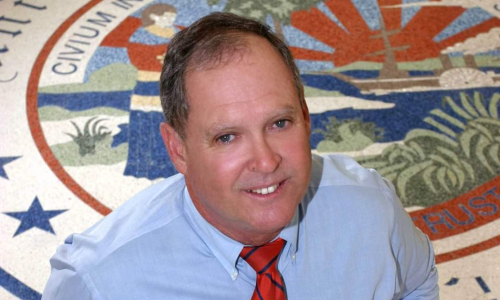
By Melissa McDaniel
Long before he succumbed to stage 4 CTE, Wayne McDaniel was an extremely talented athlete, lettering each year of high school in baseball, basketball, and football. It was his football prowess that earned him a four-year scholarship to the University of Florida. Upon graduation from UF, he coached football and baseball before joining the UF Office of Development, serving as the alumni association’s executive director for 27 years. He, like so many victims of CTE, was a highly motivated and talented individual. There was nothing he couldn’t do. But that would change.
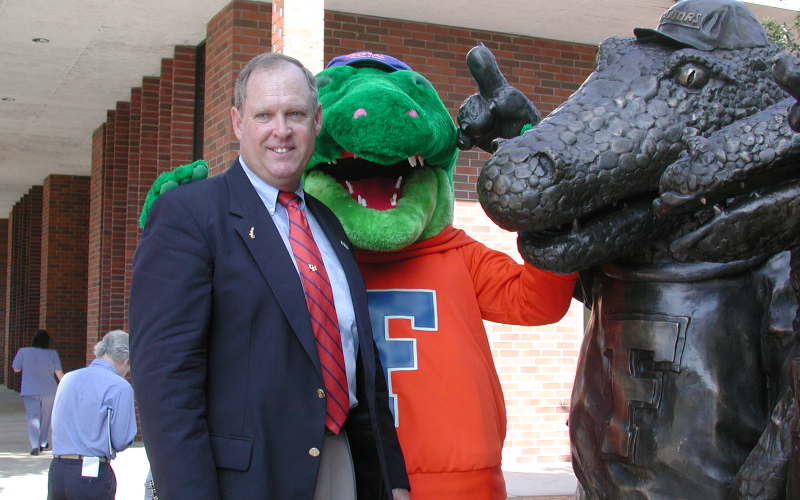
I am Melissa, Wayne’s wife. We were together over 30 years throughout the slow, destructive path of his CTE. I write this with the hope that other spouses, sons, and daughters who are currently living with the collateral damage of this disease might at least have a sense of what may lie ahead.
When we first met, Wayne was at the top of his game both professionally and personally. His extraordinary good looks (what a face!) and athleticism were captivating, but what I really could not live without were his sharp wit and talent for making absolutely everything fun. Only now, as I look back on our first 10 years together, am I able to recognize the first harbingers of what was to come. Two of those signs still burn in my brain. The first was a noticeable decrease in financial aptitude. It concerned me so much that I chose to keep my name and finances separate when we married, which turned out to be a godsend. I strongly encourage anyone noticing even a hint of change in financial habits to act immediately to protect what you have.
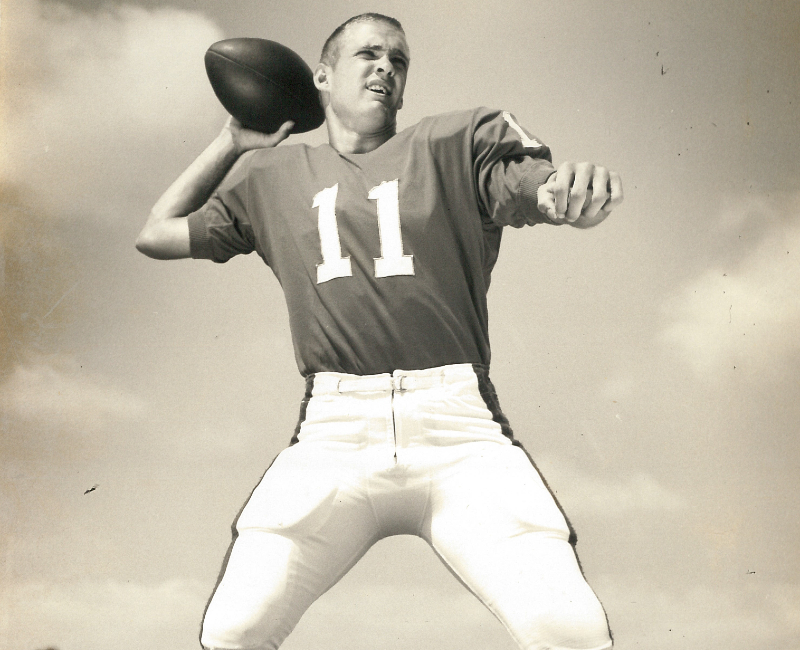
The second sign something was off was Wayne’s sudden desire to withdraw from social interactions with longtime buddies. He didn’t seem to have the energy to spend a full weekend with friends at their lake house or attend a reunion with his old teammates. Around this time, I became both protective and defensive. To save face for Wayne, I publicly blamed myself as the reason for his refusal. I didn’t realize what I was doing to protect my husband caused others to perceive me as a selfish snob and a recluse. This added to us becoming increasingly isolated at a time we needed companionship most.
The second decade of Wayne’s life with CTE brought edginess, distrust, and impatience. I remember stressing about the “why” of it all. This man — who had been so loving and warmhearted — was now quick to anger and to criticize the smallest things. He could keep it together with others outside, but inside our home, a new, sometimes frightening persona might appear. Was this male menopause? Grumpy old men’s disease? Too much stress at work? Too much self-medication with booze? CTE was still unknown to me; I needed answers but was too protective of my husband’s privacy to go public with my concerns.
Fortunately, around this time we accepted an invitation to visit the North Carolina mountains. This completely different environment with new people and experiences improved Wayne’s demeanor so much, it was like a welcome prescription from the doctor. Our impulsive decision to invest in mountain property improved our quality of life, and “quality of life” became my mantra, a goal which would help me focus in the years to come.
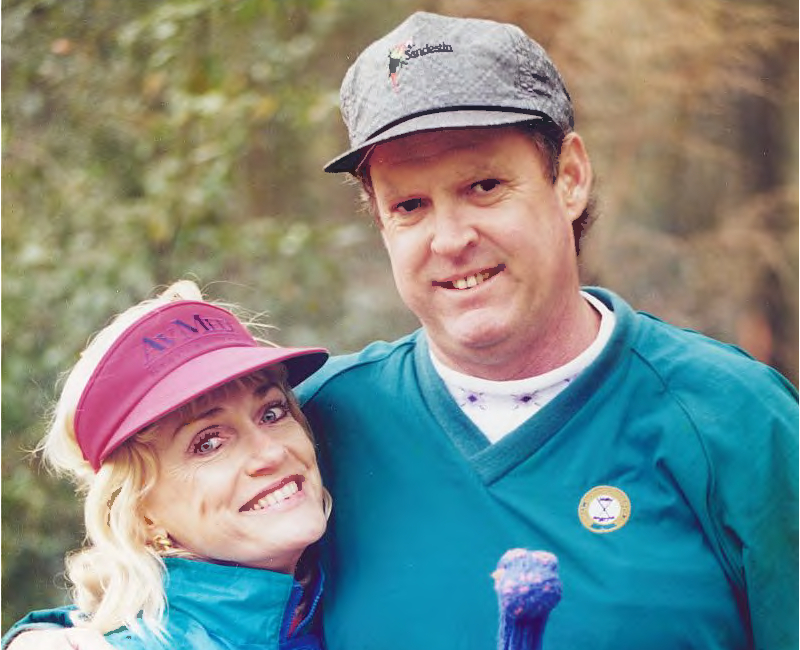
As I witnessed Wayne’s escape into a simpler mindset, I realized he was sicker than anyone knew. Shock, anger, and bargaining, the early parts of the five stages of grief, had already been happening for some time. I was fearful and depressed, but still ready to fight. Fortunately, the backdrop of my new mountain home in Asheville, N.C., was a mecca for alternative naturopathic and herbal medicine. In the years that followed, I devoured hundreds of hours of continuing education classes, sitting beside doctors and nurses with a medical mindset I didn’t know existed. It was in those courses I learned about foods, herbs, and natural compounds which might at least relieve some of my husband’s infirmities.
By the third decade of Wayne’s life with CTE, I finally became aware of the disease after watching the movie Concussion and the publicity surrounding Aaron Hernandez’s murder conviction and suicide. Almost certain my husband had it, I approached brain and memory doctors in our primary residence of Gainesville, Fla. However, Wayne’s denial that anything was wrong cast me in the light of a hypervigilant wife, and his refusal to have an MRI or submit to a psych test stopped further analysis.
We found the amino acid theanine (think green tea or matcha) helped calm Wayne to the point he could actually relax. Tyrosine is another amino acid often used by Alzheimer’s patients to achieve similar mood-lifting results. The Ayurvedic herb bacopa was also calming, and when Wayne took it regularly, his focus improved. These natural alternatives helped greatly as we maneuvered the last five years of my husband’s life. Not only did they calm him, but they also made him not hostile.
Toward the end of Wayne’s life, however, his primary doctor made me stop giving him anything natural. I had fought hard not to do that, but by that point, I was ready to give up. Soon after stopping the natural alternatives, my husband became violent, biting, kicking, and hitting anyone who came near him. By then, he was in the hospital, so I explained what was happening to the doctor on call. She researched tyrosine, the supplement I thought he was missing most, and she approved it. Shortly after I gave it to Wayne, he started to calm down. I’m not saying this works for everyone, but it did prove the viability of tyrosine to me and that particular doctor. Unfortunately, Wayne’s stage 4 CTE won the fight, and his organs failed him. He died on May 3, 2022. His death certificate lists five organ-related causes and the additional diagnosis of stage 4 CTE and Alzheimer’s disease from the UNITE Brain Bank.
Now, one year later, I dwell on the reality that there may be thousands, even tens of thousands of middle-aged men who have tau plaque growing in their brains. This is happening to them because they were dynamic, motivated athletes who did not know they were sacrificing their brains for sports. In doing what it took to earn scholarships or for the sheer joy of competing and gaining respect, they may have sacrificed their capacity to love, to learn new things, to manage their finances, even to manage their lives.
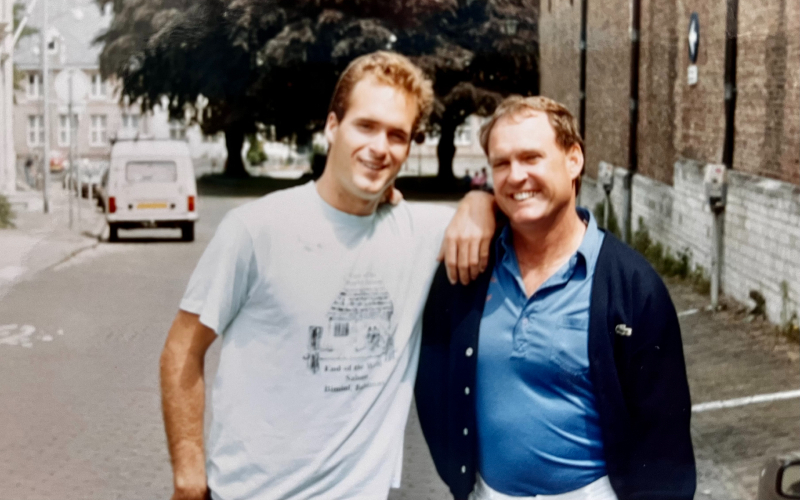
These men strive to seem as functional as possible to the outside world. But inside, they are sick. In their own homes, their spouses and children are also hurt by collateral damage from this disease. Something must be done to recognize there is a plague of CTE out there, and many victims and their loved ones may not even be aware of it.
I wish the naturopathic community would be more vocal about herbs and natural, nonpharmaceutical compounds that might help at least some of those suffering from CTE and their loved ones get through the bad days and long years. Raising awareness of the suffering from CTE is also a worthy cause. We all should do whatever we can to help the Concussion Legacy Foundation make that happen.
You May Also Like
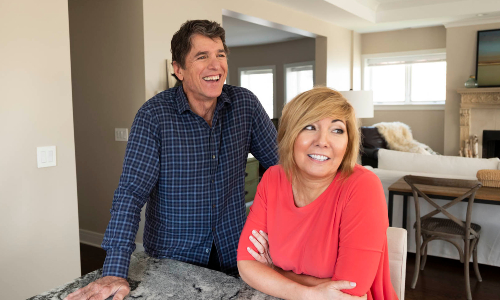
Living with suspected CTE can be difficult, but CTE is not a death sentence and it is important to maintain hope. Find out how.
Living with CTE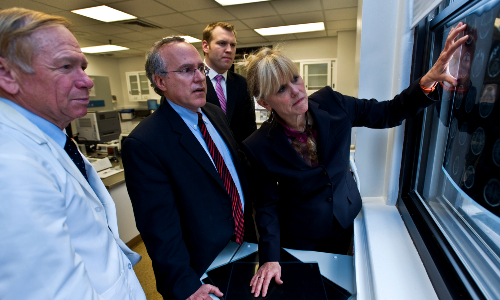
Although we cannot yet accurately diagnose CTE in living people, a specialist can help treat the symptoms presenting the most challenges.
CTE Treatments